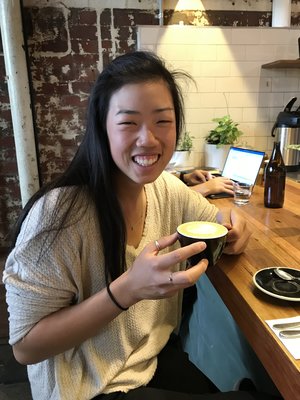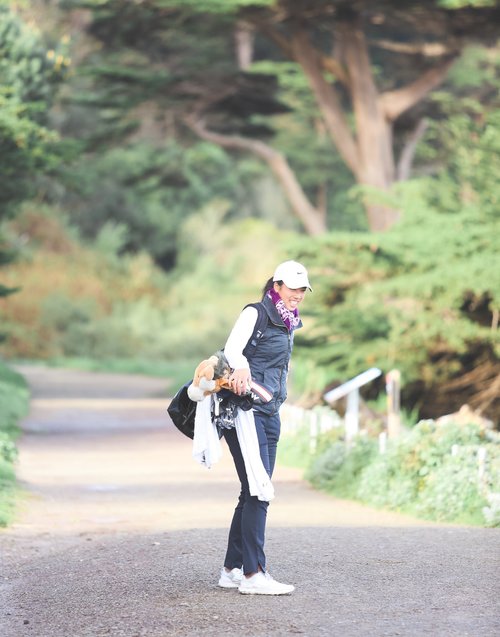Beth Ann Nichols is a writer with Golfweek magazine and a past award winner with the Golf Writers Association of America (GWAA). Her recent articles include a feature with cancer-fighting collegian Sam Humphreys and Stacy Lewis’ continuing contributions to the game even while she is temporarily off Tour.
You focus on the personal stories in the game. How do you find these stories? Do they come to you or do you seek them out?
Any number of ways. I’ve been lucky enough to spend a lot of time on the road. I don’t spend too much time in the press room, usually. I’m out walking around, introducing myself to family and friends and coaches and people who know the players best. I watch golf, but a lot of times I’m talking about something that has absolutely nothing to do with what’s going on in real time. Often times, that’s when I get my best stories, from the circle of friends and family that players have.
Sometimes there’s something on social media that you see that’s interesting and you kind of follow along. Often times having a conversation in general with my colleagues will spark something that will get me going. Actually, I wrote a story recently based on someone else’s story, about all these scholarship dollars that are left on the table in women’s college golf. That’s not true! So I wrote a column for the magazine debunking the myth, because I do believe it’s misunderstood.
So, anyway, a variety of things.
Your focus is mostly on the women’s game. You are as much a champion for the women’s game as probably anybody writing today. Why is that? It’s partly that you’re a woman yourself, surely, but also because of things you see in the women’s game that are wonderful…
I think the LPGA has a lot of amazing characters that remain unknowns. The reality is that the only “household name” on Tour is probably Michele Wie. She’s the only player right now that people who don’t follow golf and are just sports fans would recognize, and that’s solely because of her time spent on the PGA Tour. So I enjoy uncovering nuggets and telling people’s stories and hopefully shedding a spotlight on folks who really deserve it. There are still a lot of ways that the women’s tour still has a long way to go financially and a lot of other ways to catch up with the men and catch up with the Tiger Effect. I’m passionate about the game and I’m a former college player myself and just love telling stories about people. More than birdies and bogeys, I love writing about people.
This year you’ve had some great stories to write about, some that are golf-related and some that are a little more personal. What are two or three stories from 2018 so far that jump out at you from the women’s game?
Well, my favorite event so far this year was definitely the US Senior Women’s Open. Joanne Carner shooting her age, lighting up a cigarette on the range, taking a long drag in between shots. It was like a step back in time. It was so fabulous! I’m almost 39, and a lot of those players that are legendary I’ve never seen win before in person. I’ve never seen Laura Davies win a tournament in person before, so that was cool. Same thing watching Betsy King and players that I watched as a kid on television, but I’d never seen them in person competing in a major, for something that felt really big. So that was cool for me, because as a professional, these were a lot of players that I didn’t get a chance to cover or hadn’t seen win before. I think Joanne Carner carried that championship, no question. She was the most intriguing story of the event. I soaked up every minute of it, and I thought it was a tragedy that it only had four hours of television coverage total—it just kills me! I think the USGA will fix that next year.
My favorite story of the year was Haley Moore at the NCAA Championship. I don’t know how you can’t root for Haley Moore. Watching her at the ANA several years ago, thinking she might miss the cut, getting really emotional—I just thought everybody was pulling for Haley. It was sort of the same situation with Arizona the underdogs in the final. I walked around with her mother a little bit, and she opened up to me about the bullying that Haley had endured as a young golfer and a young student. I felt like Haley’s story was the kind of story that could inspire a lot of people who maybe don’t even play a sport. They aren’t involved at all, but they can see how a college event, a team event, can really make you feel like you’re part of something bigger and that you’re accepted and you can shine. You can rise above it and be a champion. I just loved all those factors about it. I thought it was phenomenal.
Here’s a question because you’re someone who looks at the players and not just the scores. Professional golf is a precarious business. We see lots of players come and go pretty quickly. What is it in a player’s character or nature that enables them to sustain a career over time and keep competing?
I’ve heard a lot of players—and the most recent would be Ariya Jutanugarn—talking about the higher purpose of why you play. You interview enough players and they’ll tell you that the euphoria of winning wears off quick. You find yourself in a hotel room by yourself, having missed your flight because you had to stay late after you won and do all the things that come with winning, and all of a sudden you’re having to rebook a flight by yourself in your hotel room, and you’re like, “This is it? This is what I’ve been working so hard for?” That wears off. Even players that win over and over, and try to become number one in the world, and then become number one in the world, ask, “Do I really want this? There’s got to me more to it than this.”
I think charity work—that’s often a huge outlet for players, something for them to focus on that’s bigger than trophies and bigger than golf. When I think they find their platform, find their reason why for doing what they’re doing beyond inspiring other people to play golf—while that is important, for sure—I think they want a little bit more. It’s not only champions. I recently wrote a story on Cindy LaCrosse and her working with animal shelters around the country. At each Tour stop she finds an animal shelter to work with and raise awareness and donate items and get dogs and cats adopted. That’s a passion for her that has helped her to refocus. You don’t have everything in your life focused around golf. I think having an outlet, having a place to go home to where you have a sense of community—because everyone needs to get away from it. It’s not just a place you go home to practice; you want a place where there are people you can unwind with and talk about things other than golf. That’s an intangible that a lot of people don’t normally think about. It’s a really lonely life, professional golf. I think people can’t really understand that until they’re in it. You can hear that, but you don’t really understand it until you’re in the middle of it.
What about you, Beth Ann? You can get caught up with golf and eat and breathe and sleep everything golf. How do you get away from it?
I do love the game, but I can definitely get overgolfed—not even from playing it, just watching it and thinking about it. I love to travel and do things. I love to travel with my golf clubs and without them. I’m fortunate to have a good home system. That’s really important. I’m married now, but when I was single and living in Orlando, it was really important to me to have people know that I was gone and miss that I was gone and be excited that I had returned. Those were people from my church, the singles group at my church. They kept track of where I was and where I’d been. That made Orlando feel like home. It’s not my hometown, but it made it feel like home. I think for players it has to be the same. They must feel the same way. When you travel 20-plus weeks a year, you want to know that people are excited that you’re back. You have other things to do that have nothing to do with your career, whatever that is. I found that at First Baptist Orlando. Life has changed since then, but at the heart of it I think that’s what we all want. That was my escape.

